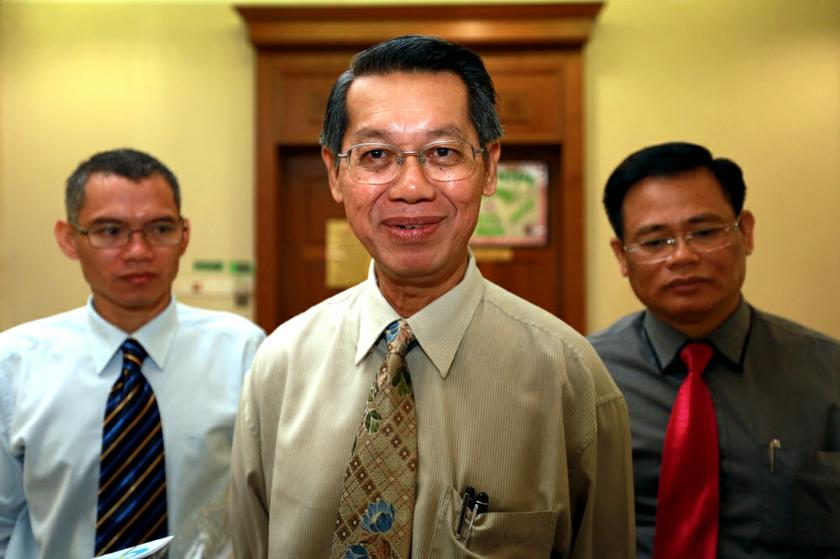KUALA LUMPUR, Oct 30 — A leading Sabah clergyman questioned today if Putrajaya was forbidding Christians from using “Allah” in songs, sermon and prayer books following the home minister’s remarks that the Arabic word ban on a Catholic paper extended to East Malaysia.
Sidang Injil Borneo (SIB) Sabah president Rev Datuk Jerry Dusing said today that it is “very restrictive” for the federal government to limit Christian usage of the “Allah” word to its bibles.
“How about prayer books? Songs?” he questioned, when approached by reporters at the court complex in the city here.
“We develop, explain and simplify for the congregation... we have to have printed materials,” Dusing added, and pointed out that the “Allah” word has been commonly used in church sermons and in Christian liturgy here for centuries.
Home Minister Datuk Seri Ahmad Zahid Hamidi said recently that the Catholic Church weekly, Herald, was not allowed to refer to God as “Allah” even in Sabah and Sarawak, due to the Court of Appeal ruling that had upheld the ministry’s ban on the word in the newspaper.
Ahmad Zahid said, however, that the Al-Kitab, the Bahasa Malaysia translation of the Christian bible, was free to use the word “Allah”.
The Home Ministry seized copies of the Herald at the Kota Kinabalu airport last week for inspection, but cleared the paper for distribution last Sunday after finding that the word “Allah” was not used.
The distribution ban is the latest controversy in recent years to erupt between the Catholic Church and the government over the use of the word “Allah”.
Prime Minister Datuk Seri Najib Razak and several other Cabinet ministers had moved to assure Christians in Sabah and Sarawak that the Court of Appeal decision would not affect them.
Earlier this month, a three-judge panel at the appellate court ruled that the Home Ministry’s decision to ban the use of the word in the Herald was justified, finding that the use of the word “Allah” was not integral to the practice of the Christian faith.
The ruling — which overturned an earlier High Court decision that the ban was unconstitutional — has since sparked confusion over the use of the Middle Eastern word by Christians in their worship, especially with conflicting opinions within the government itself on how far the ruling would affect practising Christians.
Dusing noted today the existence of the Syariah Criminal Enactment in Sabah that prohibits non-Muslims from using 32 words, including the words “Allah” and “injil” (bible).
“That means my letterhead is illegal,” he said, referring to the word “injil” in SIB’s name.
“There are laws which prevent proselytisation. Why not invoke those laws? You cannot penalise the majority for the behaviour of the minority. One off-shoot of the Christian body, we have no control. If (they are) misbehaving, take care of them. Don’t prosecute all of us,” he stressed.
Dusing also said that Sabah SIB’s 2007 suit against Putrajaya over the seizure of the church’s Christian children’s books in Bahasa Malaysia, which contain the word “Allah”, has been set for case management on November 29.
SIB had then asked the court to quash the Home Ministry’s decision and to order the return of the Christian materials that were solely meant for the church’s internal use, as well as relief through the courts’ declarations on the Christians’ right to refer to God as “Allah”.
The Home Ministry has since returned the materials to SIB, but the church is still seeking declaratory reliefs on its right to describe God as “Allah”.
“We don’t have to be grateful to anybody,” said Dusing.
“The right of Christians and any other religion to practise their faith... it’s an agreed foundation upon which we founded Malaysia. The 20-point Agreement for Sabah - the top point is freedom of religion,” he added, referring to the document that listed Sabah’s conditions in joining Malaya to form Malaysia, together with Sarawak and Singapore, in 1963.
Churches in Sabah and Sarawak have said that they will continue their age-old practice of referring to God as “Allah” in their worship and in their holy scriptures.
Several ministers also said recently that the 10-point solution issued by Putrajaya in 2011 — which allows the printing, importation and distribution of the Al-Kitab, the Bahasa Malaysia version of the Christian bible, containing the word “Allah” — should stand, despite the appellate court ruling.
The Najib administration issued the 10-point solution shortly before the Sarawak state election in 2011 to end a Home Ministry blockade of shipments of Christian holy scriptures in the Malay language containing the word “Allah”.
The Cabinet, through Minister Datuk Seri Idris Jala, had stated in the resolution that the large Bumiputera Christian population in Sabah and Sarawak could use their holy books in the Malay, Indonesian, and indigenous languages.




















